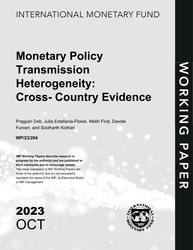
Monetary Policy Transmission Heterogeneity: Cross-Country Evidence
Monetary Policy Transmission Heterogeneity: Cross-Country Evidence
READ MORE...
Volume/Issue:
Volume 2023
Issue 204
Publication date: October 2023
ISBN: 9798400257322
$20.00
Add to Cart by clicking price of the language and format you'd like to purchase
Available Languages and Formats
| English |
Prices in red indicate formats that are not yet available but are forthcoming.
Topics covered in this book
This title contains information about the following subjects.
Click on a subject if you would like to see other titles with the same subjects.
Banks and Banking , Inflation , Economics- Macroeconomics , Money and Monetary Policy , Economics / General , Monetary policy transmission , heterogeneity , inflation , statedependence , monetary policy shock , monetary policy transmission heterogeneity , transmission of monetary policy , inflation expectation , Exchange rate arrangements , Consumer price indexes , Central bank transparency , Energy prices , Western Hemisphere , Western Europe , Global
Summary
This paper revisits the transmission of monetary policy by constructing a novel dataset of monetary policy shocks for an unbalanced sample of 33 advanced and emerging market economies during the period 1991Q2-2023Q2. Our findings reveal that tightening monetary policy swiftly and negatively impacts economic activity, but the effects on inflation and inflation expectations takes time to fully materialize. Notably, there exist significant heterogeneities in the transmission of monetary policy across countries and time, depending on structural characteristics and cyclical conditions. Across countries, monetary policy is more effective in countries with flexible exchange rate regime, more developed financial systems, and credible monetary policy frameworks. In addition, we find that monetary policy transmission is stronger when uncertainty is low, financial conditions are tight and monetary policy is coordinated with fiscal policy—that is, when the stances move in the same direction.
Copyright © 2010 - 2026
Powered by:
AIDC



